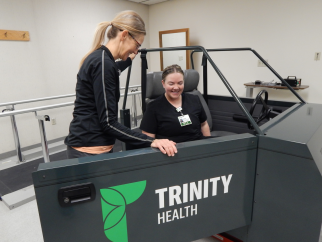Getting in and out of a car is something most of us do automatically, but if you’re someone with mobility issues, entering and exiting a vehicle can be tricky.
No problem, however, if you’re a therapy patient at Trinity Health’s inpatient rehabilitation center, RehabCare.
This past year, the center’s therapy team achieved a longtime goal to acquire a therapy car. The car, designed by therapy professionals, helps patients safely practice getting in and out of a vehicle.
“We use it with every patient in RehabCare. Unless you are someone with a power chair who uses a ramp or a lift to enter and exit a vehicle, everyone has to get into an automobile at some point,” said physical therapist Jennifer Nelson, PT.
Trinity’s RehabCare program is designed to help people restore their independence and return to a more productive lifestyle following illness, injury or surgery. A team of specialized professionals provides a comprehensive range of services to assist individuals in obtaining the highest level of functioning possible.
The Centers for Medicare and Medicaid Services requires rehabilitation units to observe and assess patients as they perform vehicle transfers as part of an initial and concluding patient assessment at the time of admission and discharge. The assessment process helps determine whether the patient has achieved functional improvement during their rehab stay.
“When the weather was nice we would take them outside to practice, assuming a family member could bring their vehicle around. But when the weather turned terrible, that wasn’t very feasible,” Nelson said.
The therapy team decided it was time to research acquisition of a dedicated therapy car. They looked at various prototypes and went with a basic model that can accommodate different features. The car looks like the front end of any generic vehicle with doors that open and close like a real car, and seats that are adjustable.
“The ability to adjust the height of the seats is really nice because folks have different types of vehicles that sit at different levels,” Nelson explained. “We can’t get the seats as high as some vehicles such as a full-sized pickup, but we can simulate most basic car levels and help them problem-solve for when they might have to get into a higher vehicle.”
According to Nelson, feedback from patients has been positive. “A lot of the people we serve really appreciate it because one of their big concerns about returning home is how do I get into my car? The therapy car gives them a chance to practice those movements so they can feel much more prepared when they get ready to leave the unit.”

